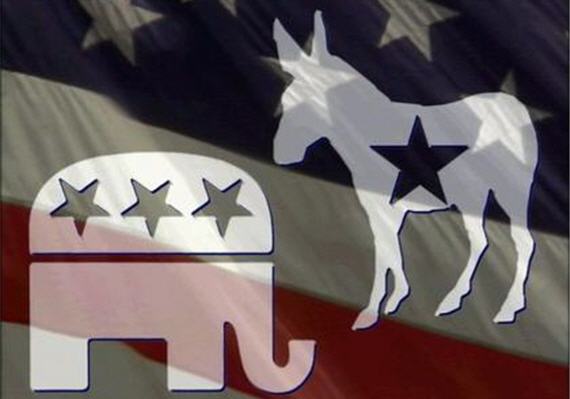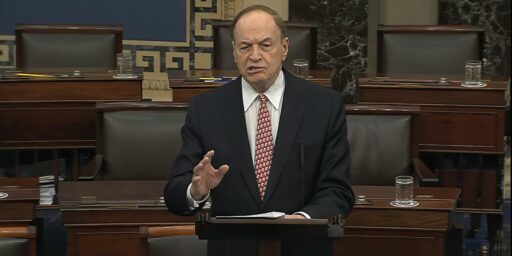Another Observation about the 17th Amendment
How would appointed Senators affect the partisan mix of the Senate?
 One simple observation that people who talk as if they would prefer appointed Senators to elected ones is that they forget that what this would mean would be locking a lot of states into perpetual representation in the Senate by one party.
One simple observation that people who talk as if they would prefer appointed Senators to elected ones is that they forget that what this would mean would be locking a lot of states into perpetual representation in the Senate by one party.
The best example that comes to mind is Massachusetts. There would have been no Scott Brown if the state legislature had been able to appoint a replacement.
For that matter, the state of Texas would have had to have waited until 2007 to get its first Republican Senator rather than the state electing its first Republican to Senate in 1961 (John Tower to replace LBJ in a special election). The bottom line is that the Texas State Legislature did not go Republican until the 2002 elections. The next chance for that legislature to select a Senator would have been for the term starting in January of 2007.
Another example: Alabama, which has had two Republicans Senators since 1997, would still not yet have had a Republican Senator, since the Democrats have controlled the state legislature since Reconstruction (a situation that will be different come the new legislature that will be sworn in next year).
One more: while California is clearly a state dominated by Democrats on the state level, there is at least the chance, at the moment, that a Republican could win a Senate seat from that state. Go to appointed Senators and one guarantees Democrats from California as far as the eye can see.
I sometimes wonder if people are thinking through the likely consequences of their preferences.






It’s fairly mind-boggling that this is even being discussed. The current “founding fathers original intention” has been taken to a fetish level by the Tea “Party” crowd and the GOP opportunists that exploit them.
What’s next? Revoking the right of women to vote? The non-propertied classes?
I was under the misguided impression that the living should have more say over the structure and scope of the government than the dead.
Is an argument from consequences really the way to go, though? I don’t have much of an opinion either way, but I’m much more inclined to listen to reasonable arguments from principles. If the consequences violate some important principle (e.g., non-aggression), that’s one thing. Fears over party victories are really quite another, don’t you think?
“Is an argument from consequences really the way to go, though?”
Well, since we’re talking about politics, I think consequentialist arguments are perfectly proper.
@Eric Williams:
But what principle is at stake here?
We seem to have two in conflict: The right of citizens to select those who will make policy under which they must live and some vague notion that states should have more power. Why is the second more important than the first?
And, surely, consequences of policy changes should be considered?
@James – I am of the radical point of view that direct election of our voting representatives is a good thing. Appointment by legislatures leaves them not only 1 further step removed, but in the end, they represent the state legislators, and not so much the citizens of the state.
If we repealed the 17th Amendment, I think it’s safe to say that the wishes of the people need not be discounted and strong choices between differing governing philosophies need not be eschewed.
Just look at the 1858 Senate election. There’s no doubt the Lincoln-Douglas debates animated the state legislative elections. People who wanted Lincoln in the Senate voted for their GOP candidate for local state legislative office. Those who wanted Douglas’s vision of popular sovereignty in territorial matters voted for the Democratic candidate for state legislature.
We hardly see that kind of engagement in state races today or seriousness of policy discussion in Senate races.
Granted, a repeal of the 17th Amendment won’t guarantee such vigorous and thoughtful debate in any or all circumstances, but it could help reconnect the electorate to being engaged in their state legislative races.
Ken Shepherd beat me to it: if state legislators appoint US senators, voters will take that into account.
That said, it is legitimate to ask people to consider that until this last election, the state legislatures vastly favored Democrats, and I imagine most people who want to repeal the Seventeenth are not Democrat voters.
Daryl Northrop: “Appointment by legislatures leaves them not only 1 further step removed, but in the end, they represent the state legislators, and not so much the citizens of the state.”
That’s a feature, not a bug. Appointment of senators was supposed to help preserve the independence of the states; you and the people of your state have much more political power when the policy that affects you comes from your governor, state legislators, mayors, etc. instead of coming from DC, where your state’s voice is merely 1/50 of the Senate and as little as 1/435 (or as much as 12% if you’re California) of the House — and perhaps not even a significant consideration in a presidential race because it’s not a battleground state.
We already have direct representation in the House; what do we gain by also having it in the Senate, where your vote is diluted by all the other people of your state?
But doesn’t that just prove that repealing the 17th amendment would result in different votes by Senators? The very premise that multiple people on this blog have been using to argue about the impotence of such a change?
@Michael:
I don’t think any of us are talking about outcomes so much as representation.
First, because of historical vagaries, Texas has been a Democratic state at the local level and a Republican state at the gubernatorial/senatorial/presidential level in recent years. But those are differences in party labels, not statewide preferences.
Second, having a Democratic state legislature appoint conservative Democrats rather than the conservative Republicans that the people want to the Senate would have perverse consequences. A conservative Democrat is a vote for Harry Reid and liberal Democratic chairmen of the vital committees. That’s not at all the will of the Texas voter.
Third, while this might have policy implications because of the incentives of party rewards systems, it’s not clear why it would make senators care more about the interest of their states than under the present system. Indeed, it might mean just the opposite. Now, Texas Senators have to please Texans, who generally prefer Republican policies. Under repeal, they’re have to please Democrats in the state legislature.
@James Joyner, outcomes is exactly what seems to be implied here:
Steven Taylor:
Steven Taylor:
@James Joyner, I’m not trying to argue that repealing the 17th amendment is a good idea. I’m merely pointing out that we’re being told that it won’t have any impact on votes senators make, and also that it would have an effect on which party those senators are a member of. I find these to be mutually exclusive arguments.
@Bryan Pick: “We already have direct representation in the House; what do we gain by also having it in the Senate, where your vote is diluted by all the other people of your state?”
The aggregated preferences of a state’s voters are different than those of various gerrymandered districts within a state, at least for a larger state. Plus, there’s the virtue of 6-year terms vs. 2-year terms.
@Michael: Right. He’s arguing that there’s no reason to think that the source of election per se is going to change incentives once in office. That doesn’t mean the state legislature would elect the same people, or even those of the same party, as the state’s voters.
So, just to be clear, will repealing the 17th amendment have an effect on what votes are cast in the Senate or not? Because it still sounds like you’re playing both sides.
So why are we debating this again? This issue was settled by constitutional amendment long ago.
Other than states-rights fanatics within the Tea “Party” and the GOP, there is ZERO popular groundswell for changing how we elect senators.
In fact, if you polled Americans, I doubt that even 20% know that senators were elected any other way than by popular vote.
@Michael: Changing the electorate — whether by changing voting requirements, redrawing district lines, or moving it from direct to indirect — will influence the outcome of elections. So, to the extent that you get different winners, you have different behavior.
But that’s not what pro-Repeal advocates are arguing. They claim that, once in Washington, the Senators will be more beholden to State interests rather than those of, well, whoever it is they’re beholden to now. We’re arguing that the evidence for this is mighty slim. We’re further arguing that it’s not entirely clear why “the interests of the state” is different than or preferable to “the interests of the people living in the state who bother to vote.”
It’s not the interests of the state, but the independence of the state, which implies more power over state matters in the hands of state legislators. As for why one might prefer that, just look up arguments in favor of federalism.
As I pointed out in a different thread, primary elections change the dynamic. For every Lieberman and Murkowski, there is a Crist or a Castle.
Maybe Crist isn’t the best example, since he did continue to run, so maybe Lowden instead.
Of course, with appointed Senators, primaries are irrelevant, so I am not sure of your point.
I’m saying that the preferred choice of the distilled will of the electorate (their ligislature) may be more apt to pick a candidate that best represents all of the entire electorate, rather than the current “lesser of two evils” scenario we typically get after the primaries.
There’s an interesting, short, history of the back ground of the 17th Amendment on the Senate website, Direct Election of Senators. Here’s snippet:
The whole thing is worth a read. In 1912, just prior to the adoption of the 17th Amendment, 29 states had moved away from the legislature appointing senators, to either direct election or selection via a party’s primary nomination. The widespread belief was the the older method of selection caused more problems than it was worth.
I agree w/ Sam’s point; most of the states prior to 17th Amendment had de facto popular elections; the 17th merely removed artificial empidiments to the system most states desired.
Also, I believe the Lincoln-Douglas debate was a significant step towards popular elections of Senators since it broke a tradition that one could not openly campaign for the Senate seat.
So, in other words, as I noted in another post, the states themselves did not see it in their vital interests to appoint the Senators apart from popular input. This further undercuts the arguments being made by those who see value in appointed Senators.
According to other sources 33 states held direct primaries for the Senate seat prior to ratification, and interestingly South Carolina was first in 1888.
Prior to this, states began using the public canvass, which was first popularized by the Lincoln Douglas debates in 1858. Prior to 1858, Lincoln waited until after the state legislature had been selected to lobby for the Senate appointment; in contrast to 1858 when the Republican Party made selecting Lincoln for the Senate seat a part of it’s platform prior to the general election. Some indication that the first public canvass was in Mississippi in 1834.
Hall, The History and Effect of the Seventeenth Amendment (1936).
@PD:
Thanks for the further information.
This does not, however, fit the fantasy of the grand era wherein the state legislatures were firmly committed to the notion that the Senators were their agents. Indeed, many of the commenters on several of the posts seem more in favor of notion that Senators should be creatures of the state legislatures than did the legislatures themselves.
Again, I would point to my follow up post that has further evidence along those lines.
No, this appears to be an odd view/revision of history in which people that speak in Jacksonian populist terms appear to be dissing Jacksonian populism. I am amused.
Sorry, if I can’t keep track of which of today’s 17th Amendment threads I should be inserting this stuff. Typical problem in the blogosphere these days.